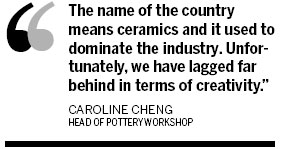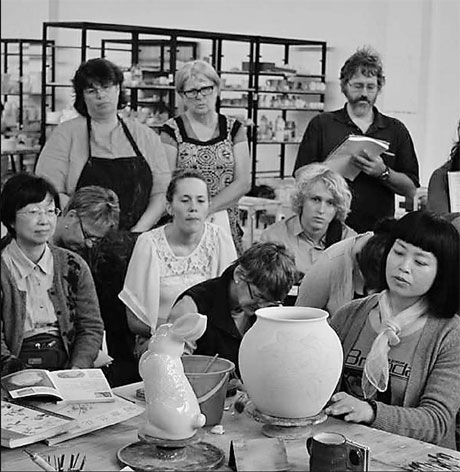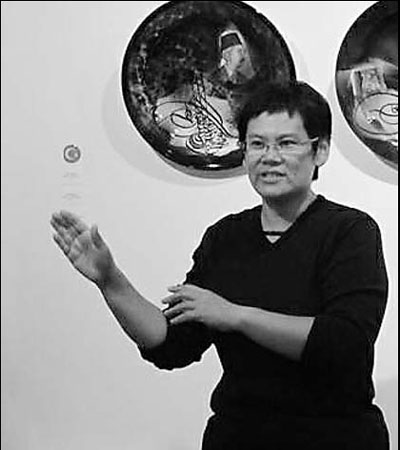Lofty Lushan Mountain
Temples in Hidden Places
On the First of August
Wheels by the Water
Share your travel story with regional@chinadaily.com.cn
Reinventing China
By Yu Tianyu ( China Daily )
Updated: 2011-05-03
|
A porcelain-making session at the Pottery Workshop branch in Jingdezhen, known as "the capital of porcelain", in Jiangxi province. Photos provided by The Pottery Workshop |
Pottery Workshop chief Caroline Cheng has dedicated herself to improving the country's ceramic products. Yu Tianyu reports.
Caroline Cheng recalls strolling around museums and art galleries looking at porcelain with her grandfather Cheng Te-K'un, a famous archeologist. Looking back it is no wonder she became a ceramist.
Currently, she heads the Pottery Workshop (PWS), a ceramics art education center, which is the largest of its kind in Asia. It was established in Hong Kong in 1985 and has branches in Beijing, Shanghai and Jingdezhen, Jiangxi province.
A deputy at the Chinese People's Political Consultative Conference (CPPCC), 48-year-old Cheng advocates creativity among young Chinese ceramists while calling for the reinvention of traditional ceramic arts.
Her mother, Alice Cheng is a well-known collector and entrepreneur, who paid HK$41.5 million ($5.34 million) for an enameled vase from the reign of Emperor Yongzheng (1722-1735) at Sotheby's in Hong Kong in 2002, a record at the time for a Qing Dynasty (1644 -1911) ceramic, and donated it to the Shanghai Museum.
"I have ceramic art genes in my family," Cheng says. "Apart from the influence of my grandfather, I'm also very proud of my mother's deeds and she always encourages me to grasp the microphone at the CPPCC annual meeting and speak out."
After majoring in painting and zoology at Michigan State University, she earned a Master of Fine Arts in sculpture from the Academy of Art College, San Francisco, and then moved to Hong Kong to pursue her career, joining PWS.
When her boss wanted to shut down the workshop in 1995 due to financial difficulties, Cheng decided to take over.
In 2002, she set up her first PWS branch in Shanghai, which offers pottery-making lessons for adults and children, and produces ceramic ware. She set up another branch in Beijing, in 2007.

The PWS branch in Jingdezhen, known as "the capital of porcelain", was set up in 2005, with a complex of studios, factories, galleries and residential areas for artists, covering an area of more than 1,000 square meters.
"When we started promoting the notion of creative arts and reinventing China's traditional ceramic art scene in 2002, no one listened to us and no government department would address the issue or give support," she says.
For instance, many of Jingdezhen's old kilns were torn down for real estate development.
"When we talked to the local authority about preserving the kilns, they thought we were crazy."
Cheng also wants to ensure the skills of craftsmen are preserved. "This is another aspect of traditional ceramic arts that should be conserved."
"The name of the country means ceramics and it used to dominate the industry," Cheng says. "Unfortunately, we have lagged far behind in terms of creativity."
The root of the dilemma, she says, is that China's ceramic arts are focused on imitation and there is a desperate need for renaissance in the industry.
"We organize creative markets at Jingdezhen for young artists to demonstrate their works and test the market," Cheng says.
Even so, Cheng says this is not an easy thing to do. For example, she says, you cannot expect artists to design articles for an English tea manufacturer, if they don't drink English milk tea.
Cheng encourages her students to pick a tea they like and drink it for the four years of their academic studies, then design a tea set.
Cheng also encourages her students to absorb ideas from impressionism or abstract art, use bold colors and seek inspiration from cartoons, combined with Chinese traditional pottery elements like blue-and-white paintings, or Chinese characters.
"As an artist trained in the West and currently living in China, my thoughts naturally turn to the culture and art of this ancient civilization and what it means to make contemporary Chinese ceramic art," Cheng explains.
|
The biggest threat to China's ceramic arts tradition is the lack of creativity, says Caroline Cheng, head of the Pottery Workshop. |
(China Daily 05/03/2011 page20)






